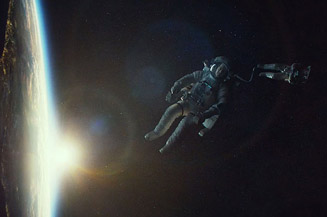Movie Review: Gravity
By Edwin Davies
October 8, 2013
Gravity, the latest film from director Alfonso Cuarón, opens with a bravura sequence in which the camera follows the actions of a trio of astronauts as they set about repairing the Hubble telescope. In an unbroken 20 minute take we watch as the cocky yet assured veteran Matt Kowalski (George Clooney) and the jittery newcomer Ryan Stone (Sandra Bullock) float high above the Earth, talking to each other about their mission in-between banter with Mission Control. There's a loose, convivial feel to the scene, but it's also disquieting. As the camera looks on coolly, things start to go terribly, tragically wrong. Pieces of debris hurtling around the Earth start to pepper the shuttle and telescope, causing catastrophic damage and sending Stone tumbling into the emptiness of space. With limited oxygen and their transport destroyed, it falls to Kowalski and Stone to try to make it back to Earth alive before they suffocate or get hit by the debris again.
While it's easy to focus on the technical brilliance of that first scene, which really is a marvel of both digital cinematography and effects that truly warrant being called special, it also serves as a statement of intent for the film. Cuarón's floating, weightless camera bears witness to events of sudden destruction and deadly misfortune with a stillness that is deeply unnerving (as is Cuarón's insistence of letting the scenes play out silently). It refuses to give the audience any relief from the terror onscreen. Despite featuring the kind of devastation porn that has come to plague modern blockbusters, the film completely avoids the frenetic cutting or shaky camerawork that has come to be associated with it. Instead, Cuarón allows the destruction to play out in long, inexorable takes, showing cause and effect play out with a rigor and focus that is wonderfully intense. It leaves the audience and its characters breathless, though the latter experience that sensation for much more life-threatening reasons.
As much as it is a work of thrilling spectacle - a sort of The Poseidon Adventure to the Stars - Gravity is also a deeply human story of survival in the worst situation imaginable. Despite the scale of the disaster that befalls them, the number of characters affected can be counted on one hand, so the stakes are always clear and concrete. There's no abstract number of possible casualties; we know precisely how many people are killed by the initial storm of debris, and we know all too well how many lives remain in peril. Cuarón never lets us forget that key fact, and neither do Clooney or Bullock.
Stranded hundreds of miles above the Earth with little hope of rescue, the two characters are left with nothing but their wits and very limited resources for their salvation. In that respect, it very closely mirrors more Earthbound survival films like Open Water or the upcoming All Is Lost, with the added complication that the vacuum of space makes every slight movement incredibly difficult to achieve, and each miscalculation is potentially fatal.
It's a brilliant premise because it makes even the many quiet moments feel incredibly menacing. Scenes of Stone and Kowalski drifting slowly towards the International Space Station, talking about their lives on Earth as a means of remaining calm, are underscored by the looming Earth, emphasizing just how insignificant they are compared to the indifferent vastness of space (it's also in these moments, more so than the action sequences, where the 3D really makes an impact since it suggests the depth and breadth of the universe beautifully, and suggest the film could easily have been called Vertigo if someone else hadn't already called dibs on that title). There are moments of real wonder in Gravity, times when the characters are able to stare at the sunrise from high above the clouds, but it's a wonder tinged with great fear and uncertainty.
Continued:
1
2
|
|
|
|




